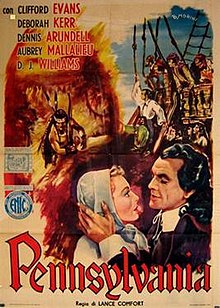Penn of Pennsylvania
| Penn of Pennsylvania | |
|---|---|

Italian poster
|
|
| Directed by | Lance Comfort |
| Produced by | Richard Vernon |
| Written by |
Anatole de Grunwald C.E. Vulliamy (biography) |
| Starring |
Clifford Evans Deborah Kerr Dennis Arrundell |
| Music by | William Alwyn (first film score) |
| Cinematography | Gus Drisse |
| Edited by | Sidney Cole |
|
Production
company |
|
| Distributed by | Anglo-American Film Corporation (UK) J.H. Hoffberg Company (U.S.) |
|
Release date
|
1941 |
|
Running time
|
78 mins |
| Country | United Kingdom |
| Language | English |
Penn of Pennsylvania is a 1941 British historical drama film directed by Lance Comfort and starring Deborah Kerr, Clifford Evans, Dennis Arundell, Henry Oscar, Herbet Lomas and Edward Rigby. The film depicts the life of the Quaker founder of Pennsylvania, William Penn. It portrays his struggle to be granted a colonial charter in London and attracting settlers to his new colony as well as his adoption a radical new approach with regard to the treatment of the Native Americans. It is also known by the alternative title Courageous Mr. Penn.
The idea of a film about Penn was developed by the producer Richard Vernon. After listening to a radio broadcast by President Franklin Delano Roosevelt, Vernon had been struck by how similar his views were to the Quaker philosophy of William Penn the next morning he approached bosses at British National Films and pitched the idea of a Penn biopic to them, securing their support.Anatole de Grunwald hastily wrote a screenplay and the film began production at Elstree Studios on 10 February 1941.
Deborah Kerr, a rising star, although not yet 20 years old, was given equal billing with Clifford Evans, who played Penn, but had far less screen time as the film primarily focused on Penn rather than her portrayal of his wife. The film concentrates of Penn's emblematic importance rather than simply as a historic individual, and he serves as a broader depiction of a freedom-loving Englishman. The musical score was written by William Alwyn, the first time he had written for a feature film. His score is generally considered far superior to the film itself.
...
Wikipedia
